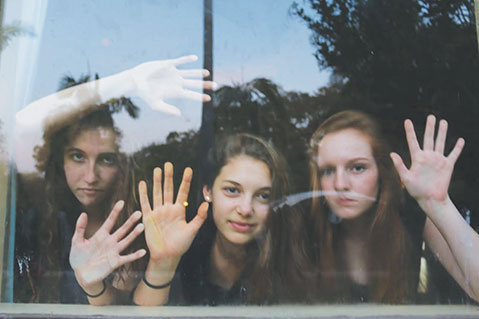Watch a Bunch of Teens Tackle Macbeth
Upstage Left Director Gets to the Heart of Shakespeare

Shakespeare wrote his plays for everybody: kings and queens, peasants and prostitutes, and every person in between. Whether he was penning a comedy, a tragedy, or a history, you can see this man, whom most consider to be the greatest writer that ever lived, doing his damnedest to tell the most deeply human stories he could tell, stories that transcended class and station and spoke to all, telling truth after truth about what a gorgeous and terrifying and maddening and hilarious and heartbreaking and truly wondrous thing it is to be alive.
Shakespeare made it his life’s work to weave stories for the masses, and that is why it breaks my heart that, over the centuries, he’s found himself trapped inside the ivory tower of academia. He’s been relegated to English classes. When most people talk about going to see Shakespeare, they talk about it like a chore, something that is good for them, something they (eye roll, deep sigh, big shrug) have to do.
When I started telling people that I was going to direct a production of Macbeth with a cast composed entirely of teenagers, I found myself on the receiving end of every weird look a person can be given. No one came right out and said it, but I picked up on the subtext loud and clear: “Have you NO respect for the Bard’s work? What makes you think TEENAGERS can tackle one of Shakespeare’s greatest tragedies? You need to leave the HARD plays to the PROFESSIONALS.”
I call shenanigans on this line of thinking. Shakespeare didn’t want his work to sit inside a glass case behind a red velvet rope. I thrill when I hear of elementary school classes performing A Midsummer Night’s Dream, of prison inmates tackling Hamlet. I think, “This is what Shakespeare wanted.” I know Shakespeare didn’t want his work to be feared, and I’m not even sure he wanted it to be revered. I think he just wanted it to be loved. And you know as well as I: You can’t love something from far away. Respect it, sure, but in order to love, you have to get up close.
Of course, when it comes to putting on Shakespeare, you have to first select a play that speaks deeply to both the cast that will be performing and the audience that will be attending. Think of it as a Venn diagram; it’s in that space where the two circles overlap that the magic happens.
Macbeth is a story about throwing caution to the wind in the darkest hours of the night, and so we created a concept for our production in which we show a group of teenagers sneaking into an abandoned building in the middle of the night, equipped with flashlights and beer to stage their own hour-long version of Macbeth. If you’re wondering why teenagers would want to stage “The Scottish Play,” consider the driving themes: seduction, obsession, betrayal, greed, violence, isolation, despair, uncertainty, vengeance, terror, insanity. If that doesn’t sound like adolescence to you, then we remember adolescence very differently.
As a cast, we have taken this centuries-old play and found all that is electric and essential in this story. We hope you will join us for an evening in the dark as we tell you a story of heroes and villains, ghosts and kings, witches and prophecies, murder and … more murder. We’re aiming to kick ass and take names with our version of the Bard’s play, which we’re calling Lights Out Macbeth. After all, we think that’s what Shakespeare would have wanted.
4∙1∙1
Upstage Left presents Lights Out Macbeth at the Unitarian Society of Santa Barbara (1535 Santa Barbara St.) on Saturday and Sunday, March 14 and 15, at 6:30 and 8:30 p.m. For tickets and info, visit lightsoutmacbeth.brownpapertickets.com.



